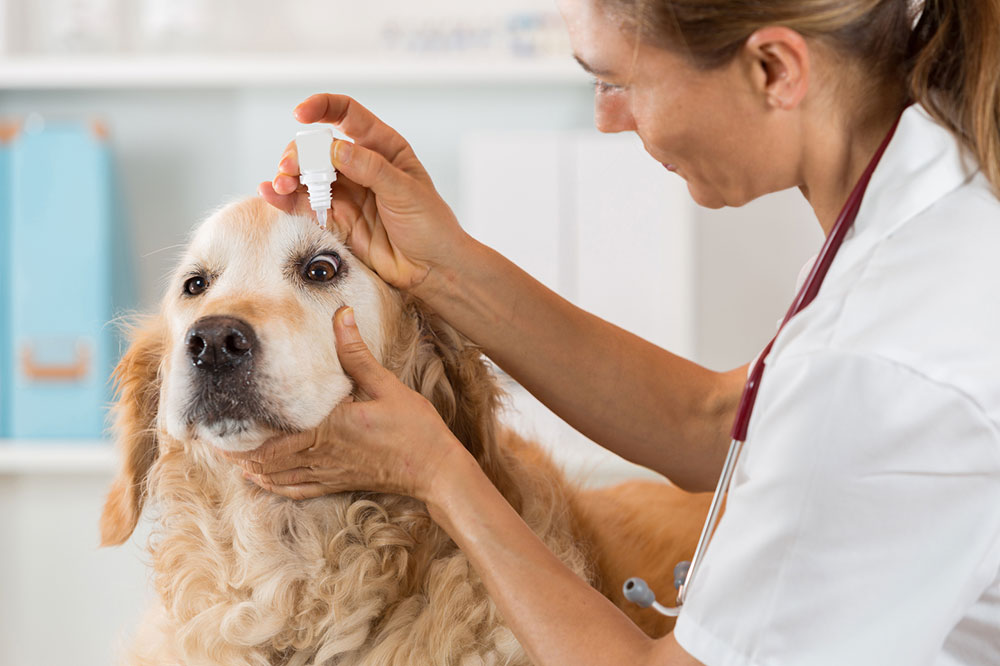Common allergies in pets and ways to treat them
Allergies are not just limited to humans. Animals also suffer from allergies, and symptoms can appear due to several factors such as foods and insect bites. The common symptoms they experience are itches, redness, and chewing of the skin. Bacterial infections and inflammations arising from the allergies can be distressing and uncomfortable for your pet.

Allergies in dogs
Skin allergies are quite common in dogs, and there may be many reasons behind such reactions. The right pet allergy treatment can help ease the symptoms, and take care of the pesky problem.
- Causes
The three main causes of skin allergies in dogs are- Food allergies
Itches near the ears and in the paws could mean food allergies. Pet allergy treatment that involves a shift in the diet can help to resolve these issues. - Environmental allergens
Dust and pollen can be equally devastating on your pet. These seasonal allergies can affect any part of their body but mainly affect the paws and the areas near the ears. - Flea allergy dermatitis
This is generally the most common kind of allergy. Flea bites can lead to itching and skin infection.
- Food allergies
- Signs
Usually, the signs of an allergic reaction will depend on the extent of the infection in your pet’s immune system. However, some common signs you need to watch out for are- Chronic ear infections
- Swelling in the face, ears, lips, or earflaps
- Hives or itches
- Diarrhea and vomiting
- Excessive licking, watery eyes (sometimes with itching), and itchy ears
While diarrhea and vomiting may represent a food allergy, the right pet allergy treatment will take care of it.
- Treatment
Testing is the only option to diagnose an allergy in a dog. Generally, in cases of environmental allergies and food, fleas, atopy, dust, and/or pollen, a minute amount of allergen is injected under the dog’s skin. If an allergy is deduced, the following pet allergy treatments are suggested:- Avoidance
The first line of treatment is avoidance. Nothing works better than to avoid the factor that is causing the reaction in your dog. For instance, if it is the grass that is causing the allergy, consider walking on paved roads. If you are unsure about the cause of the allergy, a process of elimination is the right way to find the best pet allergy treatment. - Medicines
The ideal way to treat an infection is to first use supplementary nutraceuticals that contain omega-3 fatty acids. For some dogs, such supplements will work to strengthen the natural anti-inflammatory actions of the dog. Further, fatty acids will reinforce the skin’s barrier, making it more resistant to such allergens. - Antihistamines
They are a good choice when you need to provide relief from the pesky allergic symptoms. However, while it may be easy to reach for over-the-counter medicines, it is best to let your vet decide the right pet allergy treatment.
- Avoidance
The vet might suggest an antibiotic if there is a secondary infection. Secondary infections can occur due to excessive licking, chewing, or itching. Steroids may be an option, especially when your dog is uncomfortable and super itchy. Just like with any other medicine, steroids can have side effects (may affect the liver and can increase blood pressure).
Allergies in cats
Cats are also quite prone to allergies. Let’s have a look at what causes them and what we can do treat them.
- Causes
Many substances can cause an allergic reaction in your cat. Here are the most common causes.- Food
There are many kinds of food allergies that you need to be aware of. Every cat might react differently to even common ingredients. So, it is important to keep track of what your cat eats. That is the only way to identify the irritant. - Fleas
Fleas are a nuisance and sometimes, flea-control products may also be the cause of the allergy that your cat is experiencing. Talk to your vet about the flea problem and discuss the right pet allergy treatment accordingly. - Household products
Numerous chemicals have gradually seeped into modern homes these days. These chemicals can be found in the form of cleaning agents, products, and air sprays. Your cat may be allergic to any one of the chemicals in these products. So, think about the perfume you use or the exposure to cigarette smoke as these may also be responsible for an allergy in your cat. - Plastic
Any plastic in the food or water bowls may be responsible for the allergy. Cats also have a habit of chewing paper and plastic products kept around in the house.
- Food
- Signs
Allergies may present themselves in many ways. It is important to watch out for signs that tell you that your cat is suffering from one. Here are some signs to look out for:- Wheezing, coughing, or sneezing
- Excessive scratching
- Runny or itchy eyes
- Itches in the back or the tail’s base
- Chewing of paws
- Swelling in the paws
- Diarrhea and vomiting
These symptoms must not be ignored and a vet must be immediately consulted.
- Treatment
Here are some of the best options for treating allergies in your pet cat:- Topical treatments
There is a number of topical treatment options available for fighting allergies. However, the best pet allergy treatments providing symptomatic relief. So, what works for one cat may not for another. There are shampoos, creams, sprays, and other options available these days. However, you must remember that the relief may be temporary. A vet will be able to tell if this requires additional treatment. - Monthly vet visits
Most vets will begin by getting to the root of the problem. So, a process of elimination will be used to determine the allergen. Steroids may be an option, but they are not the best as there are side-effects to consider. Vets often find the hyposensitization method to be the most effective. Here, the cat is given allergy shots that sensitize the cats to the allergen. In the case of flea allergies, monthly shots may be recommended. - Omega-3
Fatty acids are a well-known dietary supplement that can help cats to strengthen their immune system. They can also help them develop a better skin barrier to fight off these allergens. - Switching to a hypoallergenic diet
When it comes to food allergies, a switch in the diet can help. A hypoallergenic diet will make the food easier to digest.
- Topical treatments
Allergies in rabbits
It’s important for those with pet rabbits to be aware of the allergens that affect their furry friends. Here’s what you should know.
- Causes
Many objects around your home can cause allergies in rabbits. Remember that rabbits are meant to stay in open spaces. So, even if your home is clean, the products that you use for cleaning it may be causing the allergies. Some of the common causes of allergies in rabbits are- Cleaning products
There are numerous chemicals in the cleaning products you buy these days. For instance, you probably use carpet cleaners often. The chemicals present in these may be the reason your rabbit is having allergies. This also holds true for other cleaners and air fresheners you may be using around the house. So, it is best to go natural or opt for organic cleaners that put lesser stress on your pet. - Products with strong odors
Consider avoiding perfumes and other products that may have a strong smell. If you find that a certain product has a strong odor, its impact probably gets magnified for your pet. These can very easily trigger a response from their immune system, making them susceptible to an allergy. - Mites and fleas
These are probably the biggest reason for allergies in your pet rabbit. In such cases, the best pet allergy treatment may be a combination of topical solutions and others, as recommended by your vet. - Fireplace
If you often use the fireplace, make sure your home is well ventilated. These fumes and many others such as cigarette smoke may be the cause of your pet’s allergies.
- Cleaning products
- Signs
Some common signs that your rabbit is fighting allergies are- Changes in the skin and fur colors
- Sneezing
- Inflamed eyes
- Itching
- Red and watery eyes
- Ear problems
- Constant scratching
- Gastrointestinal problems
- Constant licking of feet
Beware of these signs of allergies in your pet and seek immediate treatment.
- Treatment
There are different ways to treat the above symptoms. However, a vet must be consulted to determine the best pet allergy treatment . Considering the cause of the problem, extent of the allergy, and the age of the rabbit, the vet will recommend the right approach.- When it comes to food allergies, the best approach is to eliminate the problem ingredient. A brand new diet that excludes the irritant will help.
- Natural cleaning products can alleviate problems to a large extent. Consider using fragrance-free detergents or other products such as vinegar and baking soda.
- Exposure to smoke or other environmental allergens can be effectively treated by using an air filter at home. Some of the things you may try are
- Use a fan that can bring in fresh outside air
- Maintain a dust-free environment in your home.
Allergies in birds
These cute feathered creatures suffer from allergies that most people may not know about. The factors mentioned below must be considered.
- Causes
Birds are sensitive creatures and providing them with a safe and happy environment is essential. However, small things can make a difference and these may lead to an allergy in your bird. The most common causes of allergies are- Standing water
- Food
- Pollen
- Mold
- Cleaning supplies and products
- Signs
Watch out for these signs of allergies in your pet bird:- A change in the demeanor
- Any discharge in the nares, i.e., nostrils of the bird
- Clicking sounds are normally heard when your bird has air sac mites
- Bubbles at the beak indicate a respiratory infection.
- Lack of upkeep and unclean surfaces may trigger a certain infection that leads your bird to look unkempt and dirty.
- Vomiting
Note that vomiting is different from regurgitating, and you must differentiate between these two. Vomiting might indicate an infection or an allergy.
- Treatment
To start the right pet allergy treatment for your avian friend, approach a vet. A proper examination of the pet, a look at the signs, and an understanding of the diet will help the vet in arriving at the right treatment. Among other things, the vet will note down the complete history of your pet.- If there is a skin or feather problem, the vet will assess if the bird is suffering from allergic dermatitis. Among other things, the vet will inspect the uropygial gland to arrive at a better understanding.
- A complete blood count and plasma chemistry panel will indicate the extent of the problem.
- Antihistamines and other medicines that may be administered orally or topically may be suggested for relief. There are quite a few over-the-counter or prescription medicines that may be used.
- Steroids are never given to birds as it may lead to complications. Several topical creams and lotions that are used for dogs and cats must also be avoided as it may not be safe for your bird.
- Keep the area or cage where your bird stays, clean. Avoid allergens by going through a process of elimination as well.
All in all, your pet is an integral and much-loved part of your family. So, it is important to make sure that they are comfortable, happy, and safe. By detecting symptoms early on and being aware of possible causes, you can ensure the right pet allergy treatment for them.


